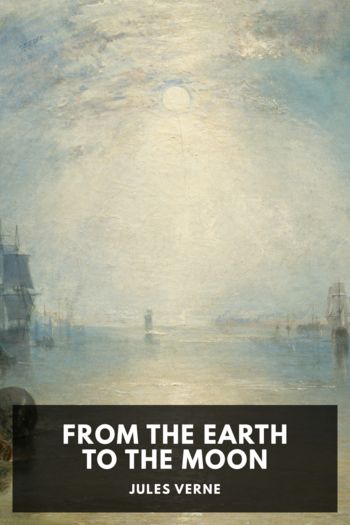Topsy-Turvy - Jules Verne (good book club books .txt) 📗

- Author: Jules Verne
Book online «Topsy-Turvy - Jules Verne (good book club books .txt) 📗». Author Jules Verne
“I have failed,” said Eric Baldenak.
“And I have not succeeded,” added Jacques Jansen.
“In regard to myself,” answered Dean Toodrink, “when I presented myself at the stores in High Street in the name of Major Donellan I found a large man in black clothes, wearing a high hat, with a white apron, which was short enough to show his high boots. When I asked him for information in the matter he informed me that the South Star had arrived with a full cargo from Newfoundland and that he was ready to furnish me with a fresh stock of codfish on account of Messrs. Ardronell & Co.”
“And,” answered the former counsellor of the Dutch Indies, always a little sceptical, “it would be much better to buy a load of codfish than to throw one’s money into the ice-water of the North.”
“This is not at all the question,” says Major Donellan, with a short and high voice. “The question is not the codfish, but the Polar region.”
“Americans ought to stand on their heads,” said Dean Toodrink, laughing at his own remark. “That will make them catch cold,” finally said Col. Karkof. “The question is not there,” said Major Donellan. “One thing only is certain, that for some reason or another America, represented by the N.P.P.A. (remark the word ‘practical’) wants to buy a surface of 407 square miles around the North Pole, a surface which is actually (remark the word ‘actually’) pierced by the eighty-fourth degree of latitude.”
“We know it, Major Donellan, and much more,” said Jan Harald. “But what we do not know is how the said company will make use of those countries or waters, if they are waters, from a commercial standpoint.”
“This is not the question,” answered for the third time Major Donellan. “A power wants to purchase with money a large part of the globe which, by its geographical situation, seems to belong especially to England”—“to Russia,” said Col. Karkof; “to Holland,” said Jacques Jansen; “to Sweden-Norway,” said Jan Harald; “to Denmark,” said Eric Baldenak.
The five delegates jumped to their feet, and it seemed as if the Council would turn to harsh words, when Dean Toodrink tried to interfere the first time. “Gentlemen,” said he, in a tone of reconciliation, “this is not the question, following the expression of my chief,” of which he made such frequent use. “As long as it has been decided that the Northern regions are going to be sold at auction, they will naturally belong to such representative who will make the highest bid for same. As long as Sweden, Norway, Russia, Denmark, Holland, and England have given large credits to their delegates, would it not be best for these nations to form a syndicate and raise a sum of money against which America could not make a bid?” The delegates looked at each other. It was possible that Dean Toodrink had found the missing link. A syndicate-at present it is heard everywhere. Everything is syndicate nowadays, what one drinks, what one eats, what one reads, what one sleeps on. Nothing is more modern, in politics as well as business, than a trust. But an objection was started, or rather an explanation was needed, and Jacques Jansen tried to find out the sentiments of his colleagues by saying, “and afterwards,” yes, after the purchase of the region by the syndicate, then what? “But it seems to me that England,” said the Major in a rough voice, “and Russia,” said the Colonel, with nostrils terribly dilated, “and Holland,” said the Counsellor; “as God has given Denmark to the Danish,” observed Eric Baldenak—“Excuse me, there is only one country,” interrupted Dean Toodrink, “which has been given by our Lord, and that is the world.” “And why,” said the Swedish delegate? “Did not the poet say
Deus nobis haec otia fecit,”
said this merryman in translating according to his fashion the close of the sixth verse of the first eclogue of Virgil. All began to laugh except Major Donellan, who stopped for the second time the discussion which threatened to finish badly. Then Dean Toodrink said, “Do not quarrel, gentlemen. What good will it do us? Let us rather form a syndicate.”
“And afterwards?” asked Jan Harald.
“Afterwards,” answered Dean Toodrink, “nothing more simple, gentlemen. After you shall have bought the polar domain it will remain undivided among us or will be divided after a regular indemnity to one of the States which have been purchasers. But our purpose would have already been obtained, which is to save it from the representative of America.”
This proposition did some good, at least for the present moment. As very soon the delegates would not fail to fight with each other, and pull each other’s hair where there was any to pull, it would be at the moment when it was necessary to elect a final buyer of this immovable region, so much disputed and so useless.
“In all cases,” cleverly remarked Dean Toodrink, “the United States will be entirely out of the question.”
“It seems to me very sensible,” said Eric Baldenak.
“Very handy,” said Col. Karkof.
“Right,” said Jan Harald.
“Mean,” said Jacques Jansen.
“Very English,” said Major Donellan.
Each one had given his opinion hoping to convince his colleagues.
“Then, gentlemen, it is perfectly understood that if we form a syndicate the rights of each State will be absolutely reserved for the future.” … It is understood. There was only to be found out what credit the different delegates had received from their governments. It





Comments (0)